In this future there are no more human police officers. Is that even possible?
The future of policing is a really really complicated topic. And it’s also, and this might be the understatement of the year, a controversial one. On this episode we’re not going to try and give you a full picture of what the future of policing might be. That would take hours. Instead, we’re going to focus on two really specific pieces of this topic.
First we talk to Madeline Ashby, futurist and science fiction writer, about robots, and what it might be like if we replaced human law enforcement with robotic law enforcement. Then, we talk to historian and writer Walidah Imarisha, about a future with no cops at all. We also hear from Doug Wyllie, the Editor at Large for PoliceOne, who, perhaps unsurprisingly, doesn’t like either proposal.
Further reading:
- Disrupt Tha Police by Madeline Ashby
- Bomb Robots: What Makes Killing In Dallas Different And What Happens Next?
- Robocop Delivers Pizza, Prevents Suicide
- 11 Police Robots Patrolling Around the World
- Machine Bias
- Hard Truths: Law Enforcement and Race
- Angels with Dirty Faces
- Wrestling With Angels: Walidah Imarisha on Harm and Accountability
- Audre Lord Safe Outside the System Collective
Flash Forward is produced by me, Rose Eveleth. The intro music is by Asura and the outtro music is by Hussalonia. Special thanks this week to Brent Rose. The episode art is by Matt Lubchansky.
If you want to suggest a future we should take on, send us a note on Twitter, Facebook or by email at info@flashforwardpod.com. We love hearing your ideas! And if you think you’ve spotted one of the little references I’ve hidden in the episode, email us there too. If you’re right, I’ll send you something cool.
And if you want to support the show, there are a few ways you can do that too! We have a Patreon page, where you can donate to the show. But if that’s not in the cards for you, you can head to iTunes and leave us a nice review or just tell your friends about us. Those things really do help.
▹▹▹▹▹▹▹▹▹▹▹▹▹▹▹▹▹▹▹▹▹▹▹▹▹▹▹▹▹▹▹▹▹▹▹▹▹▹▹▹▹▹▹▹▹▹▹▹▹▹▹▹▹▹▹▹▹▹▹▹▹▹▹▹▹▹
TRANSCRIPT
Rose: Hello and welcome to Flash Forward! I’m Rose and I’m your host. Flash Forward is a show about the future. Every episode we take on a specific possible or, not so possible future scenario. We always start with a trip to the future, then we teleport back to today to talk to real experts about how that future might really go down. Got it? Great. This year, we’re starting in the year 2072.
Tour Guide Voice: Hello! Come on through, everybody, if everybody could scoot down a little to make room, perfect. Welcome, again to the museum, my name is TK. I’ll be taking you on the tour today.
So, as you can see we’re actually in the middle of a long hallway here. The tour begins actually in the middle of our timeline, rather than at the beginning or end. To my right, you’ve got the distant past, reaching all the way back to 1704, when the colony of Carolina developed the nation’s first slave patrol. And to my left you’ve got the more recent past, stretching all the way to the present and, in the small wing beyond that, the future. But we start in the year 2037, because this is the year that peace and safety really changed completely.
Now, here’s a question for you all. Raise your hand if you are old enough to remember human police officers. Okay, a few of you. So, for the rest of you, you might not actually know this, but in this country we used to have this thing called police, and they were actually human people who would maintain law and order in our communities. But in 2037, that all changed, and law enforcement agencies were shut down throughout the entire United States. So that’s the big pivotal moment, and now let’s walk to the end of the hall to start at the beginning, and talk about how we got to that point, and where we’ve gone from there.
Walk this way please.
[murmering, walking]
Rose: Okay so in this future there are no more human police officers.
The future of policing is really really complicated. And it’s also, and this might be the understatement of the year, it’s a controversial topic. On this episode we’re not going to try and give you a full picture of what the future of policing might be. That would take hours. Instead, we’re going to focus on two really specific pieces of this topic.
First we’ll talk about robots, and what it might be like if we replaced human law enforcement with robotic law enforcement. Then, we’re going to talk about a future with no cops at all.
So let’s start with robots.
Early in the morning on July 8th, 2016, the Dallas police used a robot to kill a human. The man they killed was a sniper, a guy named Micah Johnson, who showed up to an otherwise peaceful protest in Dallas, Texas, and shot at least 12 police officers, killing five of them. Eventually, the police cornered Johnson in a parking garage for five hours. And to end the standoff, the cops sent in a robot carrying a bomb, which detonated and killed Johnson.
The technology involved here is actually incredibly simple. It’s basically a remote controlled truck with a little arm on it, to which police stap a bomb. In some cases, they actually duct tape the bomb onto the crane. But even though it’s simple, the use of a robot to kill someone is still a big deal. And a lot of people were shocked by it — a bomb delivered by a robot isn’t exactly the kind of policing you see on Law and Order.
Madeline Ashby: No it’s not something that you think of as something that police departments might have. We all have like Richard Scarry children’s books about what a policeman looks like and what their job is.
Rose: This is Madeline Ashby, a futurist and science fiction writer. And for people like her, who’ve been keeping their eye on the future of robotics and policing, this bomb delivery robot was not shocking at all..
Madeline: The U.S. government has been finding ways to justify its procurement budget in the Middle East and elsewhere by bringing military technologies to domestic shores and into small town police departments, and big city police departments as well. We’ve seen an increase in the militarization of police forces with them using weapons like LRADs and noise cannons and tanks and different types of vehicles and different types of weaponry and even different types of armor than they once did. So it’s inevitable that something like what was a bomb disposal droid or a bomb disposal robot might get repurposed by by a police department that had access to it.
Rose: And in fact, bomb robots aren’t new at all. In the 1970’s, a robot known as the Wheelbarrow was introduced on the streets of Northern Ireland. Ostensibly the Wheelbarrow was supposed to find and pick up bombs, but it doesn’t take that much for a robot to reverse that motion. And bomb robots were introduced in the United States in the 1990’s. In fact, the first few models were designed by iRobot. The same company that makes your friendly little vacuum pal, the Roomba. Let’s just hope your Roomba doesn’t start talking to those bomb robots.
Police departments all over the United States have robots like these. According to an NPR analysis, the Pentagon distributed 479 bomb robots to law enforcement agencies across the country between 2006 and 2014.
In 2015, a bomb robot like this was used to deliver pizza and a cell phone to a man threatening to jump off a bridge in California. It worked, and the man was talked out of suicide.
This is all to say that law enforcement departments all over the United States have had these robots for years. But the case in Dallas, in 2016, where a robot was used to deliver a fatal bomb, was a big step for these robots. According to experts interviewed at the time, it was the first intentional use of a lethally armed robot by the US police. In other words, Dallas was the first American police force to use their bomb robot to intentionally kill someone. That we know of.
In some ways, this trend mirrors the trend to automation more generally right? Lots of people are losing their jobs to robots, why not cops too?
Madeline: Well I think largely we’ve seen a trend toward automation and a trend toward eliminating the human from the equation in terms of making those types of martial decisions. And that’s part of a larger trend toward automation, because it’s cheap. It’s cheaper to buy a robot than it is to pay a human being a pension. It’s cheaper to buy a robot than it is to invest in training of talent. And it’s also way easier for a government or for a corporation to talk about the shiny new robot that they bought that kills people, than it is to say we’re going to make these young men and women kill people.
Rose: The same arguments you hear for automation in other industries apply just as much to police officers.
Madeline: What is what is convenient is usually cheap, and what is cheap usually magically turns out to be what is convenient for for the people making that decision. One of the most attractive things about repurposing something like a bomb disposal robot is that in a scenario like Dallas, where you have already lost people, you don’t want to lose more. And sending in a machine to do the job almost ensures that you won’t. So in that way it is a sheer numbers game that it can appear to be more convenient.
Rose: This is a big concern for cops, and it’s actually one that’s addressed in the classic dystopian film RoboCop. You didn’t think I’d go this whole episode without mentioning RoboCop did you?
In RoboCop, in case you haven’t seen it, Detroit is on the verge of collapse as crime ravages the city. In response, the Detroit Police Department essentially hands over control of its operations to a giant evil mega-company called Omni Consumer Products. And Omni is the one that proposes replacing the human police officers with robots. I’m skipping over a bunch of plot points here, from the movie. You should just go watch it, but basically they wind up using an injured cop to build this this human/machine combination that they call RoboCop.
The movie is an interesting look at a lot of things (life, death, the nature of humans, whether cyborgs are alive or not, what humanity really is, and more), but in the context of this episode in particular, it’s interesting to note that in 1987 film makers were already addressing the dangers of letting giant companies take over and provide the material support for law enforcement in the United States.
And it’s true that by and large, law enforcement guys don’t like the idea of robocops.
Doug Wyllie: The thing about the argument about robot cops is, every individual person and every individual interaction is an individual. And robots can’t do individual. Robots do many many multitudes of thousands of the same exact thing. The robot arm reaches down, grabs the pallet, puts the pallet on the truck. The robot arm moves back, reaches down, grabs the pallet, puts the pallet on the truck. And so on, and so on, and so on. Law enforcement doesn’t work that way.
You show up you don’t know what you’re going to get. A traffic stuff could turn into a nothing of a traffic stop; traffic stop could turn into a gunfight; and everything in between.
Rose: This is Doug Wyllie,
Doug: And I’ll spell it for you. W, Y, as in Yankee, L, L, I, E. No surprises on the spelling of Doug. My title is editor at large for Police One. Police One is the largest online resource for law enforcement.
Rose: We’ll come back to Doug in the second half of the show, but for now we’ll just say that he’s skeptical of robocops.
Doug: You can have robots policing robots, but you need people policing people.
Rose: On the flip side, robots might actually be able to handle some scenarios better than their fleshy counterparts.
Madeline: Imagine, for example, being able to tell a robot, or interacting with a robot, that could detect whether or not you had a concussion. So that if you had been involved in an incident of domestic violence, the robot could look at your pupils, understand that one was dilated wider than the other, and say, “we need to get you to a hospital because obviously you have a concussion.” A human police officer might not notice a tiny detail like that. And therefore because they are dealing with a concussed person who’s slurring or who who can’t remember certain details, might then also discount his or her testimony or his or her accounting of events.
Or a Robocop that is dealing with a young woman on campus might be able to immediately test her for GHB or another date rape drug just with a little prick of the finger. And that’s actually really valuable information and it’s something that current police forces can’t and won’t do.
Rose: But there’s another argument that I’ve seen made for robot cops that we should talk about, too. And that’s that robo-cops might make us all safer, and might cut down on human error in policing. The idea here is that instead of training cops about bias, or trying to reform the existing law enforcement agencies, many of whom have deeply racist and problematic cultures, we should just cut our losses and replace them with robots. Robots can’t be biased, right?
At this point if you’re a regular listener to the show you probably know what I’m about to say, robots are made by humans. And humans are biased. Science shows us that over and over again. And the idea that a robot will be somehow free of that bias, is… wrong. It’s just wrong! If you learn one thing from this podcast I hope it’s that all the things that we build are inherently biased because they’re built by us.
And we actually even have cases in policing to show that technology is mimicking the biases of the people who make it. There are currently algorithms in use across the country that are supposed to do something called “predictive policing” — guessing where the police should be and where crime might pop up based on an algorithm trained on past data. There are other algorithms being used by the courts to decide which inmates should be parolled and which ones shouldn’t. And both of those kinds of algorithms have been shown to be racially biased.
Madeline: We’ve we’ve seen algorithms that are used for predictive policing in places like New York, and other major cities across the U.S., that do reflect the bias of both their programmers and their users. Algorithms grow to reflect the user. The reason that that Netflix knows what you want or that Amazon knows what you want is because you keep telling it what you want. If you keep telling the algorithm that who you want to arrest are young black men, then it’s going to give you back young black men. If it’s a mirror, more so than anything else. We’ve started to see that happen already. It’s entirely possible that we could have very similar police forces as we have now, even though they are primarily machines.
Rose: There’s even a company called Taser International that is hoping to build algorithms that can watch police body camera footage and predict what will happen in the moment and give that data, live, to police officers in the field. The company has literally said that it is basically using RoboCop and Minority Report as road maps. To me, that is not a good thing.
But Madeline pointed out another key issue with turning the keys to the city over to robotic enforcers. Right now, in theory, if a human police officer kills someone, they have to explain why. And if they kill someone who they should not have killed, there are, in theory, consequences.
Now that process is very broken. And we don’t really have time to get into that exactly. But in theory, at least, police offices are supposed to be held accountable for their decisions.
The question is whether robots would face the same kind of accountability? Whose fault is it if a robot codes all black people as “high” on the danger scale and winds up shooting someone for no good reason? Is it the programmers? Is it the precinct that bought the robot? Does the robot stand trial?
Madeline: The machine doesn’t have to go on trial. The machine never has to do that. I mean, a family might still sue. There might still be a civil suit or a wrongful death suit, but it’s a lot easier to defend a quote unquote faulty machine, or a faulty algorithm or something that was buggy or was broken, than it is to to to defend a police officer. And it is a lot simpler. Suddenly there’s a built in defense, quite literally. There’s a built in defense.
Rose: Ethicists have been talking about the murky questions raised by killer robots for a long time — after all, it might be new that a police force in the United States is using it against US citizens, but these killing machines have been at work on the battlefield for a long time. There’s even an organization called the Campaign to Stop Killer Robots. And they’ve been pushing for the United Nations to sort out exactly what kinds of rules apply to robot death machines.
But, right now, nobody really knows. Those questions haven’t been answered.
Here’s another question: if we do wind up with robocops, what will they look like? Will they take the form of humans? Or something else? So far, the robots at work haven’t been humanoid at all. They’re little pods roaming around the mall, or a remote controlled car. And Madeline says that you shouldn’t assume that the future robocops will be human shaped.
Madeline: The morphology of robots stands to change our behavior to them. If a robot that looks like another man walks in on you beating your wife and says, “Is there a problem here?” you might react as a human to another human. When something that looks like the Mars Rover busts down your door and just blares a siren at you, and someone talks through it; that’s something else. If you can try to imagine talking to WALL-E about your drug deal that went bad, I think that weirdly talking to a thing that looks like a machine might be more comforting and might calm you down a little bit faster. If you’re actually designing to get people to respect this machine and also calm down in the face of it (or alternatively be utterly terrified by it), you have to sort of sidestep the uncanny valley scenario of something that looks too much like a human being.
Rose: Probably what will happen, is that different robots will be designed for different policing tasks.
Madeline: Ghost in the Shell: Stand Alone Complex and the Ghost in the Shell franchise had the Tachikomas, right? Tachikomas are six legged tank robots that you can climb into and ride. Or they can act completely autonomously. And they get around not having hands by having little claw shaped, egg beater type things, that are on little casters, and they can shoot webbing.
Rose: In this future I’m imagining that every police precinct has a whole warehouse of robots in a variety of forms: some birds, some dogs, some squids, a maybe some humans, and some wild hybrids. What if they all came to life at night and hung out with each other like it was Toy Story! Except with killer robots instead of children’s toys. Someone should write that comic book.
Okay while you think about that comic book, we’re going to take a break, and when we come back, we’re going to talk about whether it would be possible to have a functioning world without police at all.
[[AD]]
Hey! This is Rose. If you like this show, which, I’m guessing you do because not only are you listening right now but you haven’t yet fast forwarded through the ads, then I have another thing for you! I’m currently co-hosting another podcast! It’s about the new Hulu TV adaptation of The Handmaid’s Tale. Every week me and my cohost Laura June go over the show, dissect the themes, and generally talk about the dystopian future that it depicts. So check it out, you can get it wherever you get this podcast you’re listening to right now. The show is called The Red Center and it’s produced by The Outline. You can also find a link to it on the Flash Forward Facebook page. Okay, now on to the real ads!
[[/ADS]]
Rose: So far in this episode we’ve talked about what it would be like to replace human cops, with robot cops. But what would it be like, if we didn’t replace those human cops with any cops at all?
I think this is an interesting question in light of what we were just talking about with robocops. One of the arguments I’ve seen raised, when it comes to robotic police, is that law enforcement in the United States is so broken that it might actually be easier to replace them all with robots than to reform the culture of policing.
I don’t know if that’s true, and we know that assuming a robotic replacement will be free of bias isn’t true. That’s been proven time and time again.
So… what if we didn’t have police at all? Are they a necessary condition in this world? A lot of people seem to assume so, but it’s always good to question our assumptions.
And many activists in the United States have proposed abolishing the police and the prison system. We explained the prison side of things in season one, episode 14 about the ways life extension technology might impact prison sentences. But what about abolishing the police? Is that even possible?
Well, unsurprisingly, Doug, our law enforcement guy, thinks that would be a bad idea.
Doug: I wrote an article, some time ago, addressing this topic and in it quoted Hobbes. It would be nasty brutish and short. Life would be very very difficult for a certain segment of the population who would be victimized by career criminals.
Rose: And this is the argument I’ve seen a lot in the various Facebook and Twitter fights that invariably break out about police brutality. There’s this idea that we MUST have the police, and that without police we would descend into some kind of apocalyptic state where everybody was murdering each other constantly and it’s like the The Purge all the time. But, it seems to me like there’s probably another way to think about this. And to do that I called Walidah Imarisha.
Walidah Imarisha: I think that you cannot understand the way that policing happens currently without understanding the history. And I think that there’s been a lot of work done to embed in each of us and in the society this notion that police are indispensable. That they’ve always been here; the thin blue line is the only thing that protects us from complete chaos and brutality and anarchy in the streets.
Rose: And Walidah points out that history doesn’t exactly support this idea that without the police, we’d all be hiding in the corners of our homes from roving bands of criminals.
Walidah: I think that it’s important to recognize that it is a conscious creation. This concept that police have always existed and must always exist. The reality is police have not always existed, that there have been many different forms, historically, of ways that communities have addressed issues of harm and kept themselves whole.
Rose: Walidah is a historian, writer and poet who currently lectures at Stanford University. She’s the author of a book called Angels with Dirty Faces: Three Stories of Crime, Prison and Redemption. And she also points out that in many communities the police have never been the first line of defense when something is going on. As late as the 1960’s, Black folk in the South, for example, rarely called the police because so many officers were actually members of the KKK.
Walidah: It was only a few years ago that the concept of calling the police, especially in the south, was even a possibility for Black folks. There are many people who are still alive who knew that you never called the police because the police and the Klan were often one and one in the south. So, in the 1930s, in the 40s, the 50s, and 60s, these police were upholding these brutal institutions of segregation. And so communities who were oppressed had to figure out how to address issues within their community without even the thought of calling the police.
Rose: It’s worth pausing here to give a little bit of history about policing in the United States. A lot of things led up to the formation of a codified police force, but the biggest one was slavery. Modern police forces are direct descendants of slave patrols. During slavery, these groups of vigilantes were set up to hunt down and punish any slaves who might run away or try to revolt. After slavery, those patrols largely maintained their function in upholding oppression: they made sure that the now freed black people of the United States couldn’t exercise their rights, and they punished anybody who tried. Around the 1830’s, those slave patrols were then made official, by turning them into legitimate police departments. Many scholars like Michelle Alexander, Angela Davis and others, have argued that this history is inescapable, and totally shapes the ways in which law enforcement operates today. Even the director of the FBI has admitted that this ugly history impacts the way law enforcement works, and contributes to racial bias in policing.
Again, this episode can’t really unpack the entire history of policing and all the ways that it can, or should, be fixed. So let’s go back to our more narrow question: is it possible for a community to thrive without police.
Walidah is one of the people who coined the term “visionary fiction.” Visionary fiction essentially argues that activists are engaging in a form of futurist fiction — they’re imagining a world for themselves and their people that doesn’t yet exist.
And to her, one of the futures that she’d like to imagine, and to see happen, is one without the police or prisons.
Walidah: I believe that we actually have to abolish police, we have to abolish prisons, because they’re actually not making us more safe or making us less safe. And we need to begin to now re-envision different ways of addressing harm that is done in community, and making sure that communities are whole and accountable outside of these carceral mentalities. And I think that there are many, many, many people around the world and here in the U.S., historically, currently and futuristically, who are creating those systems and doing just that.
Rose: And Walidah wants to replace that carceral mentality with something called transformative justice.
Walidah: Transformative justice says: Yes, we must address the harm that people do to each other, most often in community, and it is often serious and sometimes horrific harm. And you have to understand that we have to also change the larger society to truly transform the situations that created this harm. And so, yes we need to build alternatives to policing through a huge variety of different ways; from community mediation to accountability processes in community. But also part of abolition of police and prisons is addressing racism, and white supremacy, and classism, and sexism, and homophobia, and inequalities in housing, and inequalities in education. That we actually have to address the ways that this society is fundamentally unjust before we can truly create real justice.
Rose: Now, this all might seem kind of foreign to you. It did to me originally, probably because I’m a white person who has never been forced to question my relationship with law enforcement. And it also might seem kind of … vague. The system we have now is clear cut and simple, if brutal: you do something bad, you get arrested, you go to trial and you go to jail. You’re reprimanded with a specific set of predetermined punishments. What those punishments are depends on who you are. It’s not really that one to one, its not that codified. That’s basically how it works and, in theory, we all just move on.
Transformative justice is more complicated. But… the world is more complicated. And Walidah points out that a lot of us do probably have experience with handling justice without calling the police.
Walidah: In our individual lives we do engage in holding those complexities. One example I always use is: if we’re at a family barbecue and everyone’s getting just lit. And Uncle Joe is three sheets to the wind, just tipsy beyond words, he’s staggering around. And he’s like “OK guys I’m going to head out now, I’m going to drive myself home”, we don’t call the police and say, “Uncle Joe is about to commit a serious crime you need to come lock him up.” Even though drunk driving kills. Immense amounts of people every year. But what we say is, “we know Uncle Joe. We are going to do what we can to keep Uncle Joe safe, as well as keep other people safe.” And so we come up with a variety of creative solutions based on the situation. “Oh Uncle Joe let me call you a cab.” “Give me your keys. You’re going to sleep it off on my couch tonight.” “I’m going to drive you home.” “Hey, Uncle Joe, why don’t you just sit down and watch this movie with us for a little bit,” knowing that Uncle Joe is probably is going to pass out 20 minutes into the movie. You get real creative with solutions when there are people that you know and love.
Rose: I don’t want you to discount Walidah as a naive idealist. In a lot of the critiques I’ve read about police reform and abolition and transformative justice, critics act like these activists think that crime is going to magically disappear This is the main critique Doug had of this idea.
Doug: The overwhelming majority of crimes are committed by a very, very small population of people, by comparison to the three hundred plus million citizens who populate the United States. And those people just wouldn’t go away, overnight.
Rose: But I think that is not quite a fair critique of what these people are talking about. Because Walidah and these activists have never said that they think that people will suddenly stop inflicting pain onto other people. And Walidah is very frank about the challenges that come with removing systems like prisons and the police. In her book, Angels With Dirty Faces, she addresses the big question: what do we do with rapists, or murderers?
Walidah: And I think that this is the part that is really challenging for folks and is really, admittedly, unfulfilling for folks. It is easier, as as folks who want to abolish prisons and police, to talk about the majority of folks who are incarcerated for nonviolent crimes or for drug offenses and that those folks should not be there. And I think that we see the tide shifting in some ways, in the mainstream, in that folks are beginning to be much more open to that than they were ten or fifteen years ago. But I think that to be true abolitionists we also have to say, “what do we do when people do do serious harm?” And I think ultimately there aren’t any easy answers, which is also why it’s easier to say, “let’s just lock folks up, because it’s a solution.” Whereas transformative Justice says each solution is unique because each issue is unique because everyone involved is unique in that situation.
Rose: There are some local programs around the country that are trying this approach. Where I live in New York City, there’s this program called the Safe Outside the System Collective, which is part of the Audre Lorde Project. The project really focuses on community based strategies to dealing with hate and violence, as opposed to going to the police. And it works, they’ve had really great success in all sorts of metrics.
Walidah: Their work to address harm done against lesbian, gay, bisexual, transgender, queer folks of color in community actually strengthened that entire community and made that entire community better able to withstand the forces of gentrification that every community in urban settings is under attack from right now.
Rose: I think the challenge with all of this stuff is scale, right? How do you take this community that has done so well, and try to learn from it and apply those lessons other places? And figure out which lessons don’t apply other places. These are all really hard questions, and Walidah knows it.
Walidah: Ultimately we’re going to have to struggle with each individual issue. And I think that that’s incredibly difficult and unfulfilling for us in a society that focuses on easy answers and quick fixes.
Rose: But one future Walidah is very sure she doesn’t want, is robocops.
Walidah: I think it’s a terrifying, horrific idea, that honestly keeps me up at night because. Robots are not creating themselves, at this point. Humans are creating them, humans are coding them, humans are programming them. Any AI, any robot, any creation is learning from us. So if we don’t address the institutional inequality that programs each of us with these racialized oppressive frames, those frames are absolutely going to be transmitted to any sort of robot or AI that gets created. Any, they will not have a moral compass to be able to question that as they move forward.
Rose: So that’s three votes against robocops. Four if you count me. Sorry Murphy.
[[music up]]
That’s all for this episode. For more information about robotic law enforcement and transformative justice, head to flashforwardpod.com where I’ll post a bunch of links.
You might have noticed that his episode is a little bit shorter than our episodes have been in the past couple months. My full time job at ESPN, where i’m producing these audio documentaries, is really ramping up and we are launching our audio documentary series in June. So keep an eye out for that. I will talk to you about it, when it comes out, but it is taking up most of my time. So this episode and next month’s episodes are probably going to be a little bit shorter than you’re used to. It’s just a lot of work to do both at the same time.
Flash Forward is produced by me, Rose Eveleth. The intro music is by Asura and the outtro music is by Hussalonia. Special thanks this month to TK and Brent Rose. The episode art is by Matt Lubchansky.
If you want to suggest a future we should take on, send us a note on Twitter, Facebook or by email at info@flashforwardpod.com. I love hearing your ideas! And if you think you’ve spotted one of the little references I’ve hidden in the episode, email us there too. If you’re right, I’ll send you something cool.
And if you want to support the show, there are a few ways you can do that too! Go to flashforwardpod.com/support to see all the ways you can give. And if giving isn’t in the cards for you, that’s fine! Just tell a friend about the show!
Okay, that’s all for this future. Come back next time, for a new one!

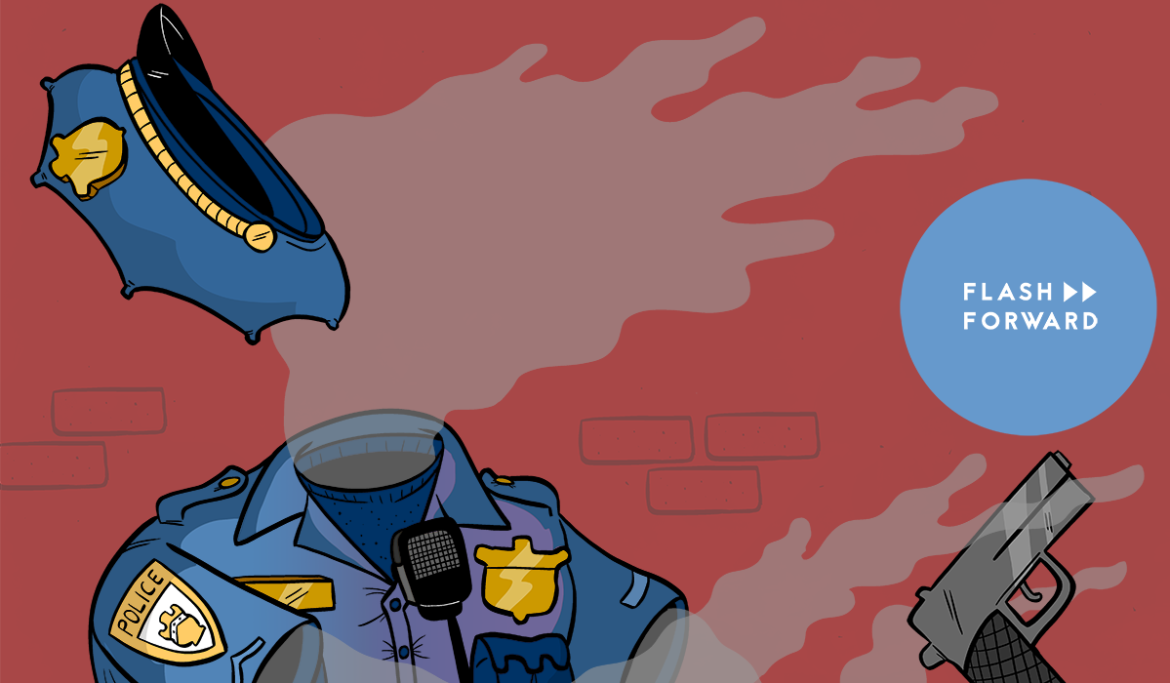

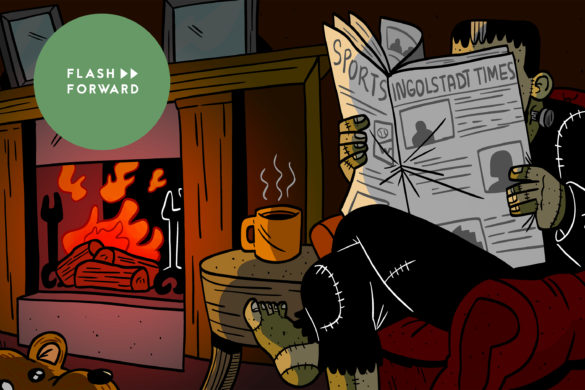

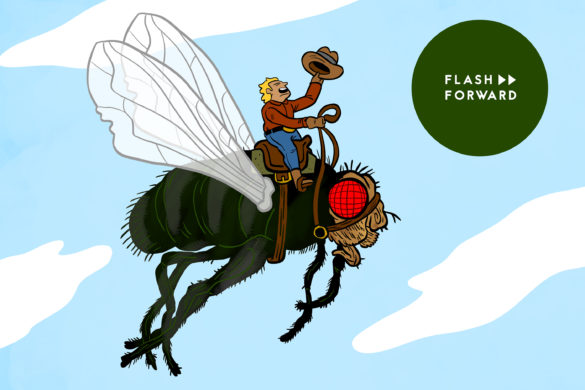
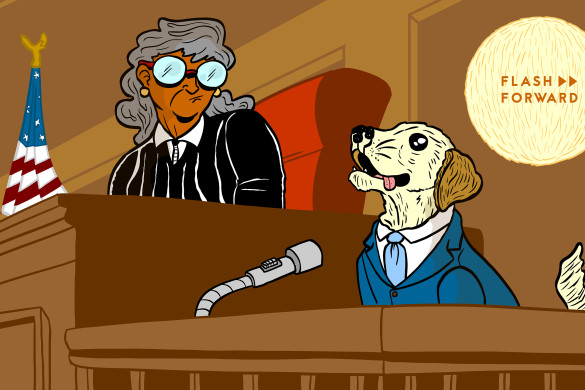
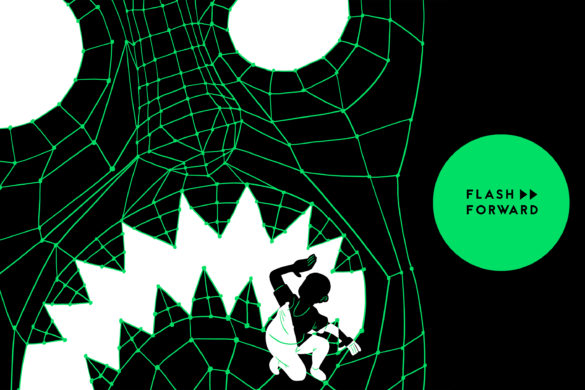
6 comments
[…] Robot Cops 36 mins – “In this future there are no more human police officers. Is that even possible? The future of policing is a really really complicated topic. And it’s also, and this might be the understatement of the year, a controversial one. On this episode we’re not going to try and give you a full picture of what the future of policing might be. That would take hours. Instead, we’re going to focus on two really specific pieces of this topic. First we talk to Madeline Ashby, futurist and science fiction writer, about robots, and what it might be like if we replaced human law enforcement with robotic law enforcement. Then, we talk to historian and writer Walidah Imarisha, about a future with no cops at all. We also hear from Doug Wyllie, the Editor at Large for PoliceOne, who, perhaps unsurprisingly, […]
[…] episodes: “Where’s the Beef?” (Aug. 10, 2016); “Robocop” (May 2, […]
[…] episodes: “Where’s the Beef?” (Aug. 10, 2016); “Robocop” (May 2, […]
[…] episodes: “Where’s the Beef?” (Aug. 10, 2016); “Robocop” (May 2, […]
[…] episodes: “Where’s the Beef?” (Aug. 10, 2016); “Robocop” (May 2, […]
[…] https://www.imdb.com/title/tt0043456/?ref_=nv_sr_2 Robocop […]